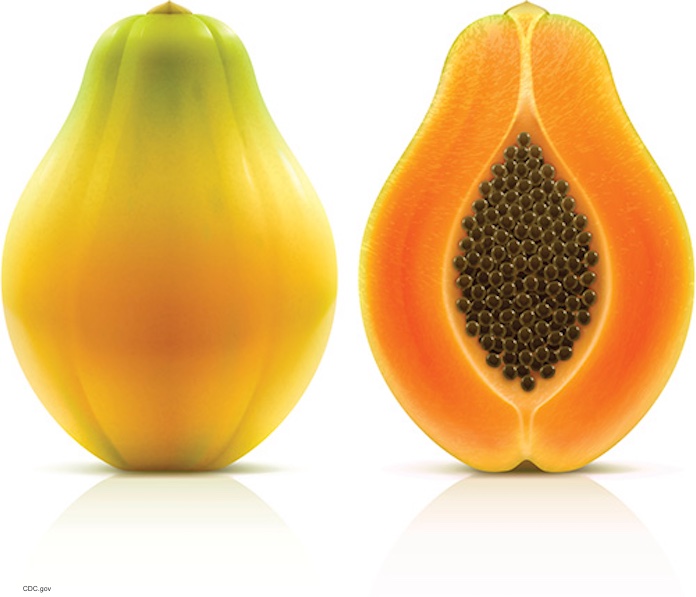A multistate outbreak of Salmonella Kiambu infections linked to yellow Maradol papayas has sickened 47 people in 12 states, according to the Centers for Disease Control and Prevention. Maryland officials warned consumers about this potential outbreak with a recall of Caribeña’s brand yellow Maradol papayas this week. The CDC’s announcement did not mention any brand of papaya in particular, but did state that “Salmonella Kiambu infections are linked to yellow Maradol Papayas en Español.”

The case count by state is: Iowa (1), Kentucky (1), Louisiana (1), Maryland (5), Massachusetts (1), Minnesota (1), New Jersey (12), New York (13), Pennsylvania (4), Texas (1), Utah (1), and Virginia (6). Twelve ill persons have been hospitalized, and one death has been reported in New York City.
Epidemiologic and laboratory evidence indicates that the papayas are a likely source of this outbreak. The CDC is recommending that consumers not eat, restaurants do not serve, and retailers not sell this product until more is learned about this outbreak. In addition, consumers and facilities should wash and sanitize countertops as well as drawers or shelves in the fridge where the papayas were stored.
No recalls have been posted as of 11 pm on Friday, July 21, 2017. The FDA, the agency that would issue a recall, is working with federal and state officials to investigate the contamination’s source.
The PulseNet system is being used to identify illnesses that may be part of this outbreak. DNA fingerprinting, using pulsed-field gel electrophoresis and whole genome sequencing are being used to identify potential patients. WGS showed that isolates taken from patients are closely related genetically. This means that the people in this outbreak are more likely to share a common source of infection.

Attorney Fred Pritzker, who has represented people sickened in Salmonella outbreaks, said, “unfortunately, produce can be contaminated with pathogenic bacteria.” Call 1-888-377-8900.
Illnesses started on dates ranging from May 17, 2017 to June 28, 2017. The patient age range is from less than 1 year to 95, with a median age of 27. Among ill persons, 67% are female. Fifty-eight percent of the 31 people interviewed in this outbreak are Hispanic.
In interviews patients answered questions about their exposures to possible sources and the foods they ate before they got sick. Eleven of 25 people (44%) said they ate papayas, which is a significantly higher proportion than typical papaya consumption.
An illness cluster in Maryland was identified this week. Several ill persons there ate papayas purchased at the same location of a grocery store the week before they got sick. Salmonella Kiambu and Salmonella Thompsons bacteria were isolated from samples collected from ill persons. Then, the Maryland Department of Health collected papayas from that grocery store to test for Salmonella. One sample yielded the outbreak strain of Salmonella Kiambu and another sample yielded Salmonella Thompson.
WGS analysis showed that the Salmonella Kiambu on the papayas isolate in Maryland is closely related genetically to the Salmonella Kiambu isolates from ill persons. Maryland health officials are telling residents in that state to not eat Caribeña’s brand yellow Maradol papayas. If you aren’t sure if you purchased that brand or not, ask your grocer. When in doubt, don’t eat the fruit.
The symptoms of a Salmonella infection include abdominal cramps, diarrhea, vomiting, and a fever. Symptoms usually begin 6 to 36 hours after exposure to the bacteria. The illness usually lasts for four to seven days. Most people recover without treatment. But some people may have diarrhea so severe, or develop sepsis, a blood infection, and need to be hospitalized. In rare cases, such as this outbreak, Salmonella infections can cause death.
If you or a loved one is experiencing these symptoms after consuming yellow papayas, please see your doctor. The long term consequences of a Salmonella infection can be serious, including high blood pressure and reactive arthritis. Those who are more likely to have a severe illness include young children, the elderly, people with weakened immune systems, and those with chronic illnesses.
Pritzker Hageman, America’s food safety law firm, successfully represents people harmed by adulterated food products in outbreaks throughout the United States. Its lawyers have won hundreds of millions of dollars for survivors of foodborne illness, including the largest verdict in American history for a person harmed by E. coli and hemolytic uremic syndrome (HUS). The firm also publishes the E-news site, Food Poisoning Bulletin, a respected source for food safety news and information. Pritzker Hageman lawyers are regularly interviewed by major news outlets including the New York Times, CNN, and the Wall Street Journal. In addition, the firm represents people harmed by pathogenic microorganisms in Legionnaires‘ disease, surgical site infection and product liability cases.




